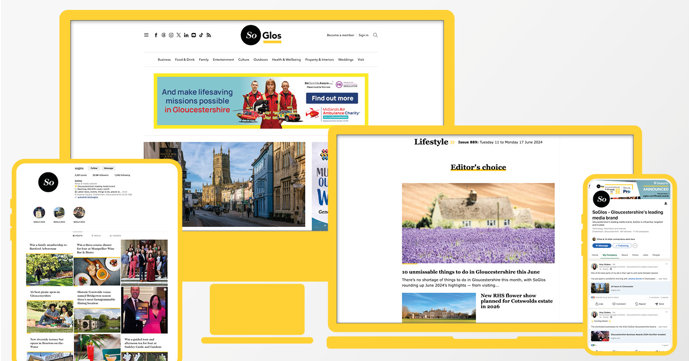With the Prime Minister planning to end all Covid-19 restrictions in February 2022, the hospitality and tourism sector is looking forward to the year ahead.
But with staff shortages continuing to cause problems for local businesses, SoGlos spoke to Visit Gloucestershire director, Steve Gardener-Collins, to get his expert advice on how to attract and retain staff in this vital sector.
About the expert – Steve Gardner-Collins from Visit Gloucestershire

Steve Gardner-Collins is a director of Visit Gloucestershire and is on a mission to achieve responsible and sustainable tourism in the county.
Visit Gloucestershire provides a non-competitive platform that allows local tourism businesses to share ideas, build relationships and work together.
The UK is currently facing a national staff shortage in the hospitality sector. What is the situation like here in Gloucestershire?
We’re in the same situation as all our colleagues nationwide and, much like 2020 and 2021, we remain in a critical position in 2022.
Currently there are circa 1,500 jobs available across Gloucestershire in tourism and hospitality. Whilst unemployment is reducing and the talent pool remains high in the county, there just isn’t the desire to join the sector.
Tourism and hospitality has been the entry level, short term, weekend job. When people think about careers, they aren’t thinking tourism or hospitality in the numbers needed for the jobs now available.
What is causing the current staff shortage? Is this a hangover from the Covid-19 pandemic?
We have a legacy, Brexit and Covid-19 toxic trio that we are dealing with at the moment.
We haven’t encouraged young people over the last couple of decades to take career moves into hospitality which has now left a legacy of skill gaps.
Brexit was a huge departure of talent and ever since, there hasn’t been the historical pool of talent arriving from Europe. Colleagues left, went home and didn’t come back. We also lack an inbound flow of people looking for work which doesn’t help matters.
We all remember the spring of 2020, the first lockdown and the redundancy and reskill campaign – many colleagues left the sector during lockdown, found new jobs and new careers, never to return.
How is this impacting Gloucestershire’s hospitality businesses on a day-to-day basis?
Gloucestershire’s hospitality businesses have coped and are coping very well. Covid-19 has given the sector a chance to really think about the customer experience and it has tested the delivery of service.
Customers have equally, on the whole, been very forgiving of the staff shortages, but for how much longer?
Covid-19 caused an inevitable reduction in services – service hours were reduced, menu options were limited – these were all perfectly understandable during the difficult time of the last two years. However, if staff shortages are to continue – and right now, I see that as the case – how will business adopt a new sustainable model to survive the current shortage?
What can businesses do to attract people to work in the sector?
At this stage, businesses can reach out to make themselves available to work experience and apprenticeship opportunities, or be open to a new workforce that has traditionally relied on experienced personnel joining teams.
At this time, the industry needs to offer more training and work closely with community groups, schools, colleges and universities to help develop the awareness of the sector; promote the job opportunities available; support the development of courses; be open to training choices; and review their CSR, linking to more inclusive and accessible practices in the recruitment process.
The GFirst LEP Skills Strategy has also recently been released and Visit Gloucestershire, as part of the delivery of support to the sector, is working quickly to action the task ahead. But this isn’t a quick fix solution; this isn’t going to get sorted overnight.
What can businesses do to keep the staff they currently have, who may be tempted to go elsewhere?
We’re all aware of the reputation hospitality and tourism has for its pay structures, working hours, recruitment and training. Controversially, our sector is also guilty of employing cheap labour – by that, I mean, it employs colleagues who need work and will often take whatever is on offer, live in conditions with their job that many wouldn’t and tolerate pay that many wouldn’t.
So, this is where it changes. If you are only to employ British talent, expectations are far higher. Parents will encourage their children to take good jobs, with good pay – way above the minimum wage. We won’t tolerate poor living conditions linked to our jobs and we will want to be rewarded for our hard work and be offered ongoing training, development and appreciation.
The minimum isn’t good enough anymore, it’s time we took careers in hospitality seriously and not just focus on gross profits.
What advice can you give businesses facing difficult decisions as a result of staff shortages?
Be the best, offer more. It’s dog eat dog for businesses recruiting. We have seen colleagues take new jobs offering higher salaries and leave weekly – where staff are in short supply, pay becomes the main bargaining tool and it appears many staff will follow the highest wage.
Not in all cases though. Environment, opportunity, development and reward are all important, too. We must learn from the past, cheap labour is now not in big supply, therefore we must review the reputation and change it. Low wages are not appealing, poor working environments and bad management styles are not effective.
Review your company, its policies and its culture. With better practice, you’ll become the employer of choice.
Do you anticipate things improving when self-isolation rules end?
There is no doubt, isolation when testing positive for Covid-19 is putting a strain on resources for every business, not just hospitality, but ending it will help. What we do need to be, though, is careful. We can’t relax too much and become complacent. Covid-19 won’t have gone away.
For many, it does make you unwell and regardless of isolation rules, when staff do catch it, they will need at least a couple of days off to recover, so the consideration for cover will still be needed. You won’t want someone with Covid-19 coughing over guests or staff, just because they don’t have to isolate.
Thinking of staff and customer welfare, you don’t want to be the employer who doesn’t care, either – if staff are genuinely sick, they shouldn’t feel they have to come in.
When reviewing staff benefits, sick pay has always been the minimum for many, they can’t afford to be sick, but if it isn’t in your control, you should be paid not to come in. The impacts on businesses are far worse and more costly if sickness is out of control. Limit the infection and let’s learn from experience about infection control.
These new practices shouldn’t all disappear, for many, they have been vital to protect vulnerable colleagues, family and friends.
What support is out there for local businesses facing staff shortages currently?
We’re at the start of recovery and this is where we will be tested. With Covid-19 regulations changing, now is the time that strategy and plans become action and activity. There are lots of routes you can take to work with recruitment partners, training partners, local services and links to communities.
Visit Gloucestershire is about to launch its action plan around the subject of skills and while I said earlier that this isn’t a quick fix for the sector, we all have a role to play, businesses can become a partner of Visit Gloucestershire and benefit from a growing network of support – and our partner hub signposts to many services available in the county.
We continue to work closely with delivery partners, Gloucestershire County Council, GFirst LEP, Growth Hubs, local districts, business groups, private partners and community groups. So reach out and in most cases, there is someone who can help.


















